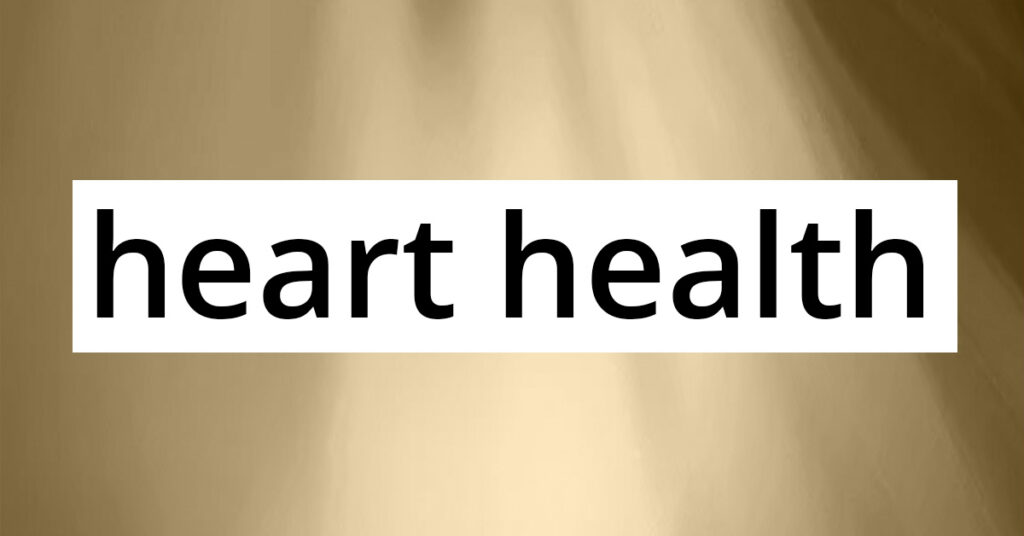I know I keep repeating this….but listen up, ladies: Heart disease is the leading cause of death for women in the U.S., yet most of us don’t connect the dots between menopause and our heart health. Surprise—menopause isn’t just about night sweats and hot flashes. It’s also a pivotal time to give your heart some serious TLC. February is Heart Health Month, so let’s break down the link between menopause and cholesterol and how you can keep your ticker in top shape.
The Menopause-Cholesterol Connection: What’s Happening?
As estrogen levels drop during menopause, our cholesterol levels often climb—and not in a good way! Estrogen helps manage cholesterol by metabolizing fats in the liver and escorting bad cholesterol (LDL) out of the body. When those estrogen levels nosedive, LDL can spike, HDL (the “good” cholesterol) can dip, and your heart health may take a hit.
Recent studies also link lower levels of anti-Müllerian hormone (AMH), another hormone that declines during menopause, to a worse cholesterol profile. Add in lifestyle shifts like reduced exercise and changing eating habits, and it’s no wonder your cholesterol levels might start throwing a tantrum.
Know Your Numbers
Menopause is the perfect time to prioritize cholesterol testing and overall cardiovascular risk assessments. A simple blood test can measure:
- LDL (Bad Cholesterol): Aim for less than 100 mg/dL.
- HDL (Good Cholesterol): Shoot for 60 mg/dL or higher.
- Triglycerides: Keep these under 150 mg/dL.
Speak with your doctor about getting even more advanced lipid testing to get a deeper look at your heart health, including two newer tests (I just had the Lp(a) test done.):
- Apolipoprotein A and B (ApoA and ApoB): These proteins are important markers of cholesterol transport in your body. ApoA is associated with HDL (good cholesterol), while ApoB is linked to LDL (bad cholesterol). High levels of ApoB can indicate a higher risk of plaque buildup in your arteries.
- Lipoprotein(a) [Lp(a)]: This is a genetic risk factor for cardiovascular disease. Lp(a) is a lipoprotein that is very sticky and more likely to contribute to plaque buildup in arteries and increase the risk of heart disease, stroke, and blood clots. High levels of Lp(a) can increase your risk for heart attacks and strokes, even if your LDL levels are normal. It’s a test worth discussing with your doctor, especially if you have a family history of heart disease.
By the way, this is not part of a standard lipid panel. Be sure to ask for this test!
Take Control of Your Cholesterol
Good news! You’re not at the mercy of your hormones. Here are some practical tips for keeping your cholesterol in check:
- Chat with Your Menopause Specialist: Yes, I said menopause specialist—not just any healthcare provider. (Hello, we deserve experts!) Discuss your cholesterol numbers, fasting blood sugar, and blood pressure. Together, you can craft a personalized heart-healthy game plan.
If your numbers are elevated, it might be advised to see a cardiologist.
- Consider Medications: Statins can be a lifesaver for some women, but the decision depends on your unique risk factors. Hormone therapy (HT) may improve cholesterol, but it’s not typically prescribed for this reason alone. Still, it’s worth the conversation.
- Eat Heart-Smart: Follow a DASH-style diet with plenty of fruits, veggies, lean proteins, and high-fiber foods like oats and beans. Omega-3 fatty acids from fish or supplements can also give your heart a boost.
- Move Your Body: Regular exercise is a non-negotiable. Aim for at least 150 minutes of moderate activity (like brisk walking) or 75 minutes of vigorous activity each week.
- Ditch Tobacco: Smoking is a one-way ticket to heart disease. If you need help quitting, ask your doctor for resources.
- Get Your ZZZs: Quality sleep (7-9 hours per night) can lower your heart-disease risk. Prioritize rest like it’s your new favorite hobby.
The Bottom Line
Cholesterol changes during menopause aren’t just numbers on a chart—they’re signals about your heart health. The good news? With the right information, support, and a few lifestyle tweaks, you can protect your heart and feel empowered through menopause and beyond.
Stay fearless, fabulous, and informed!
Sign up for Fearless VaginaTM A Crash Course in Mastering Menopause
Check out my fabulous Fearless VaginaTM Store
If you want to educate your employees, colleagues, or friends about menopause, look no further! Book Ellen for your next event.
Sign up for Menopause Mondays® Blogs
Be sure to follow me on Instagram, Facebook, and LinkedIn.
*EllenDolgen.com does not recommend, endorse, or make any representation about any tests, studies, practices, procedures, treatments, services, opinions, healthcare providers, physicians, or medical institutions that may be mentioned or referenced. The information, including opinions and recommendations, contained on this website is intended for informational and educational purposes only. Such information is not intended to be a substitute for the advice of an appropriately qualified and licensed physician or other healthcare provider.





